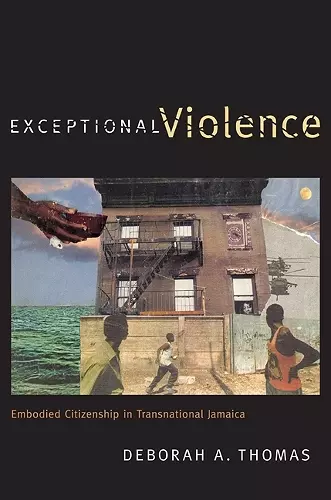Exceptional Violence
Embodied Citizenship in Transnational Jamaica
Format:Paperback
Publisher:Duke University Press
Published:5th Oct '11
Currently unavailable, and unfortunately no date known when it will be back

This ethnography of violence in Jamaica repudiates cultural explanations for violence, arguing that its roots lie in deep racialized and gendered inequalities produced in imperial slave economies
Exceptional Violence is a sophisticated examination of postcolonial state formation in the Caribbean, considered across time and space, from the period of imperial New World expansion to the contemporary neoliberal era, and from neighborhood dynamics in Kingston to transnational socioeconomic and political fields. Deborah A. Thomas takes as her immediate focus violence in Jamaica and representations of that violence as they circulate within the country and abroad. Through an analysis encompassing Kingston communities, Jamaica’s national media, works of popular culture, notions of respectability, practices of punishment and discipline during slavery, the effects of intensified migration, and Jamaica’s national cultural policy, Thomas develops several arguments. Violence in Jamaica is the complicated result of a structural history of colonialism and underdevelopment, not a cultural characteristic passed from one generation to the next. Citizenship is embodied; scholars must be attentive to how race, gender, and sexuality have been made to matter over time. Suggesting that anthropologists in the United States should engage more deeply with history and political economy, Thomas mobilizes a concept of reparations as a framework for thinking, a rubric useful in its emphasis on structural and historical lineages.
“Deborah A. Thomas’s Exceptional Violence is at once methodologically astute, richly researched, and critically engaged. In reframing the historical object of violence in Jamaica, she enables us to see hitherto obscured dimensions of its embodied constitution as social practice and social imaginary, its relation to citizenship and gender, the state and community, racial subjectivities and transnational migrations. It is a fine achievement.”—David Scott, Columbia University
“In this supremely engaging book, Deborah A. Thomas puts to rest a number of procrustean, often racist, preconceptions about violence in Jamaica and, by extension, other postcolonies. Arguing persuasively against ‘culturalist’ explanations, she seeks to make sense of the incidence of and the preoccupation with violence in Jamaica by placing that violence in its proper historical context—one that turns out to be highly complex, deeply entangled, and temporally disjunctive. But Thomas does more than this. She opens up a window into the very soul of Jamaica and its diasporas, examining how Jamaicans today envisage and make their futures; how new, embodied forms of subjectivity and citizenship are being practiced and performed; and how we may understand the role of ‘culture’ and representation in these processes. Exceptional Violence is the kind of book from which not only every anthropologist but every intelligent reader will learn something worth knowing. And worth thinking deeply about.”—John Comaroff, University of Chicago and the American Bar Foundation
“Exceptional Violence is a complicated study.... In her analysis of the way anthropology deals with violence, slavery, inequity, crime, and so on, Thomas demonstrates broad reading and a highly critical mind.” -- Gert Oostindie * European Review of Latin American and Caribbean Studies *
“The volume… [is] an academic engagement of the imagination, possibly the last bastion for generating some creative insights into what ails Jamaica generally.” -- Ralph Premdas * Ethnic and Racial Studies *
“What is most impressive about this ethnography is Thomas’s ability to consistently link her work to an existing body of scholarship in the various fields on which she draws in developing her analysis. This is a well-researched book that offers a thorough engagement with relevant scholarship. It is a key part of the global conversation on violence and reparations in the African Diaspora.” -- Keisha-Khan Y. Perry * Journal of Latin American and Caribbean Anthropology *
“Exceptional Violence is a theoretically sophisticated examination of contemporary Jamaica, with much to offer students of postcolonialism, anthropology, transnationalism, and the African diaspora.” -- Mark Anderson * Bulletin of Latin American Research *
"I recommend this book to all persons from varied and interlocking disciplines of critical theory, critical race theory, politics, economics, history, and philosophy.... Additionally, any person keen on making informed and constructive contributions to discussions about issues that shape within the United States should visit Thomas’s work and learn from her." -- Julian Ledford * Ameriquests *
ISBN: 9780822350866
Dimensions: unknown
Weight: 449g
320 pages